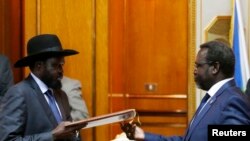South Sudan’s President Salva Kiir and rebel leader Riek Machar have agreed on a power sharing formula in a deal to establish a national transitional government that would help steer the world’s newest nation to elections.
The two warring leaders also called on their troops for an immediate cease-fire Friday during the ongoing peace talks in Ethiopia’s capital, Addis Ababa.
Warning
Regional bloc, the Intergovernmental Authority on Development (IGAD), has warned that any of the two parties that violates the agreement faces sanctions including travel bans and asset freezes.
“So we agreed on leadership functions that is the function of the president, the functions of a prime minister and the functions which they would share, joint functions. But we still have to agree on the structure of the leadership,” said Machar.
The leaders presented a proposal to leaders in IGAD as the two parties return to their respective bases to consult with their officials about the next step forward, according to Riek Machar, a former South Sudan vice president and leader of the rebels fighting the government in Juba.
He expressed confidence that a peace agreement with the administration in Juba could soon be reached.
“From my perspective, a peace agreement is going to be struck. It’s a very serious commitment and the two warring parties should shoulder this responsibility and steer the country towards uniting the country and uniting the people, and also implementing the agreement,” said Machar.
“So I propose that it will be steered by the president and the prime minister. There are voices that want to include other structures between the prime minister and the president. So, we left this to be discussed further. The president will discuss in Juba and we will discuss in the bush with our leadership on how to go,” he said.
Divergent views
The power sharing agreement will have Mr. Kiir as president and Machar as prime minister. But discussions are still ongoing about positions like a vice president and deputy vice presidents.
According to rebel representatives, while Machar and his group want to see an arrangement with only a president and a prime minister position, supporters of Mr. Kiir would like to see a vice president and two deputy positions created as well.
Some South Sudanese say both President Kiir and Machar are to blame for the ongoing conflict for lacking the political will to peacefully reach an agreement and respect its stipulations.
But, Machar said IGAD mediators are to blame.
“Part of it is the way the mediation is doing it, the IGAD mediation. You know that we complained many times on the mediation process, and the government has also last week complained [about] the process,” said Machar.
“But we are trying to take charge, now that we are talking face to face with each other and I think there would be progress. And actually we achieved the progress in face to face talks between me and President Salva Kiir,” he said.
Machar called on neighboring countries to withdraw their troops from South Sudan, a key rebel demand. But the government has often rejected the demand saying it is security cooperation between sovereign nations.
“We don’t want our country to be occupied by foreign forces…our people are also suffering humanitarianly, many have been displaced and many have lost their lives and property is of concern to me and I believe that is of concern to President Kiir, and therefore we must push forward to get a peace agreement,” said Machar.





